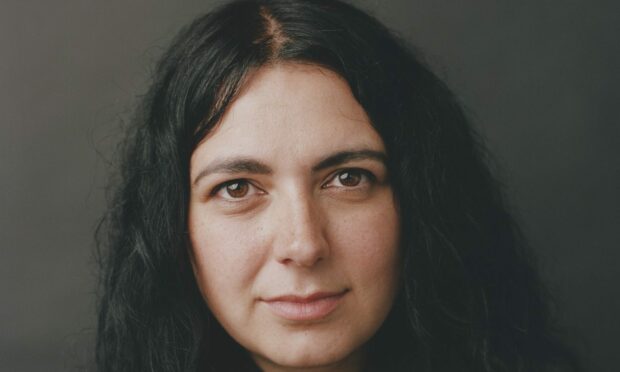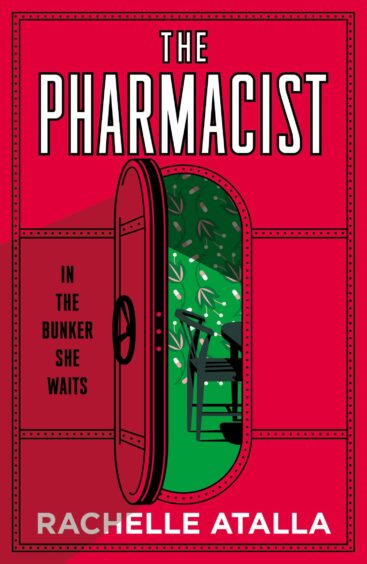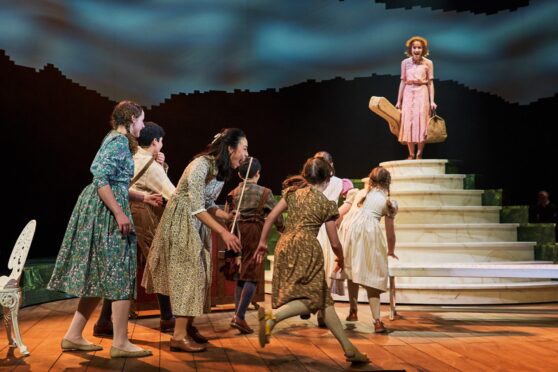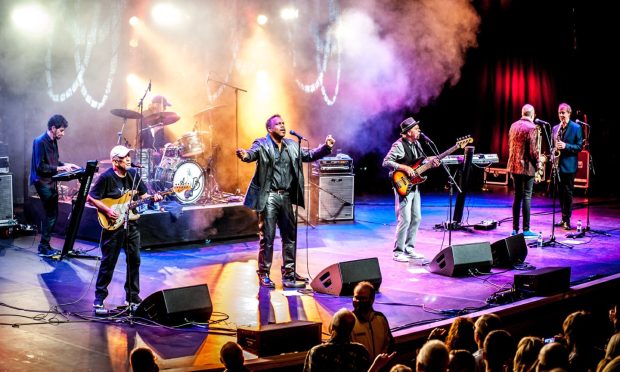For Scottish-Egyptian debut novelist Rachelle Atalla, human behaviour is one of her greatest fascinations.
“It comes down to character, and the kindnesses and cruelties that we impose upon one another,” she explains.
“I think that underpins all my writing — from short stories to screenwriting and the novel.”
Dystopian thriller
Rachelle, 36, lives in Glasgow with her husband and two children, aged three and six.
She is a short story writer and screenwriter and now her first novel, The Pharmacist, has just hit bookshelves.
In the dystopian, speculative thriller, people are living in what is known as the bunker while the outside world suffers the after-effects of what appears to have been nuclear war.
The narrator, Wolfe, is a pharmacist who prescribes medicine under the watchful eye of an increasingly erratic leader.
As her relationship with this leader evolves, Wolfe must navigate her volatile, underground home and decide what price she is willing to pay to stay alive.
A pharmacist herself
Mirroring her protagonist, Rachelle actually worked as a community locum pharmacist for almost 12 years. She gave up two years ago to pursue her writing career.
But, Rachelle explains, she didn’t always want to write about the profession: “For the first eight years of working as a pharmacist and writing in the evenings I never wanted to write about pharmacy.
“I needed to compartmentalise and didn’t want the two worlds to collide.
“While I was figuring out what voice to use to tell the story in the book, when I landed on it being a pharmacist, it was an epiphany moment.
“I started writing the voice of Wolfe and so much just poured out.”
A microcosm of society
In her novel, Rachelle describes the bunker as a microcosm of society and she sees pharmacies this way too.
She goes on: “You were seeing so many people, you didn’t know what was coming each day. Some would be at their most vulnerable and you didn’t really know them. I’ve always found that dynamic interesting.”
Working as a locum, Rachelle found herself travelling around the central belt to different community pharmacies. Her writing began as a hobby and developed into a full-blown career.
She says: “I qualified as a pharmacist in 2008 and started locuming. There’s a lot of responsibility with the job and I found it quite anxiety-inducing because I was worried I might make mistakes.
“A couple of years in, I needed a creative outlet — something different and that would help me switch off.”
Starting writing short stories
Unsure what she would be good at, Rachelle started attending evening writing classes at Glasgow University and began writing short stories.
As her writing took off, working as a locum meant Rachelle could work flexibly. It was while on maternity leave with her youngest daughter that she decided to concentrate on her writing.
Rachelle has another novel due out with her publisher next year and is also working on other projects, including developing a four-part mini-drama as well as her first feature-length screenplay with BBC Films.
Writing about a subject matter she knows so well has been cathartic: “It’s a really good way for people to see a world they don’t know. It dawned on me that pharmacists have never had their moment in the sun.”
Rachelle wrote a screenplay called Trifle at the same time she was working on her first novel, and these were her first stories about pharmacists.
Starring Tam Dean Burn, the film was commissioned by the Scottish Film & Talent Network in 2020 and has enjoyed success at festivals including the LA Shorts International Film Festival.
Rachelle has relished her recent book launches and is looking forward to more appearances at festivals over the summer.
‘Margaret Atwood is a genius’
She says she enjoys a “real spectrum” of authors: “Someone like Margaret Atwood is a genius, particularly her book Oryx and Crake.
“I remember reading that and thinking it was so ambitious with the scope of the world that she created.
“It was probably the first time I wondered if I could write speculative fiction. You get to ask big societal questions that are harder to ask in a world that already exists.”
Rachelle’s next book, Thirsty Animals, is another work of speculative fiction.
It’s all about water shortages and is set on a livestock farm close to the Anglo-Scottish border.
She adds: “I thought: ‘what are things that scare you and keep you up at night? I’m going to write about those’.”
The Pharmacist is out now, published by Hodder & Stoughton.













Conversation